“Can dogs get monkeypox?” This question, and others, are being raised by concerned dog parents in light of the 2022 outbreak of monkeypox. To help put your mind at ease and provide reliable facts, integrative veterinarian Dr. Julie Buzby answers 10 FAQs about monkeypox in dogs.
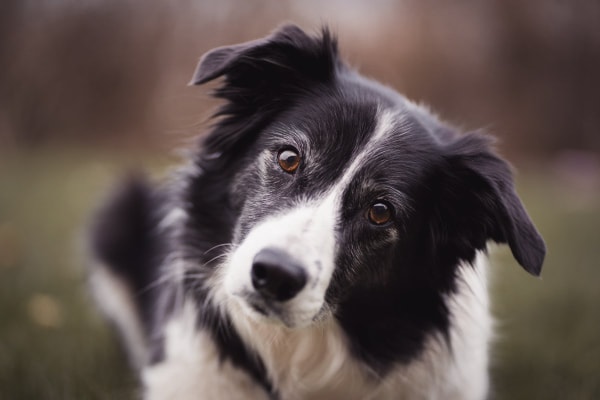
Last week, I had a long-time client call me. After he greeted me, the first words out of his mouth were “Dr. Buzby, do dogs get monkeypox?”
As it turns out, he had been watching a news segment about monkeypox and it got him thinking. He had already done research about how to protect himself and what signs to watch for. But he wasn’t sure about how best to protect his beloved senior dog.
Understandably, my client had a lot of questions about monkeypox and dogs, and I’m sure you do too. So as a veterinarian and senior dog expert, I wanted to answer 10 monkeypox FAQs based on what we currently know about monkeypox and dogs.
FAQ #1: What is monkeypox?
Monkeypox is a virus that usually affects African rodents (e.g. rope and tree squirrels, African giant pouched rats, dormice) and non-human primates (e.g. monkeys and apes). It is caused by the monkeypox virus and is closely related to the virus that causes smallpox in humans. Thankfully, monkeypox is less contagious and less severe than smallpox.
While there has been a multi-country outbreak in 2022, overall monkeypox is still a rare disease, with cases primarily affecting wild animals and people in Africa.
FAQ #2: Can dogs get monkeypox?
Yes, health officials believe that dogs can get monkeypox. However, it is rare. An Italian Greyhound was the first (and only) reported case of a dog contracting monkeypox from an infected person.
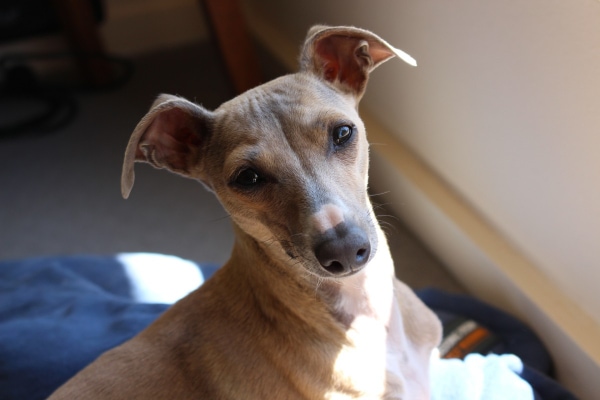
The Centers for Disease Control and Prevention (CDC) advises that we should assume that most mammals can be infected or carry the monkeypox virus. Regarding domestic animals, pet rabbits and mice are more likely to contract the disease than dogs. Additionally, while there has not been a reported case yet, it is assumed that cats can get monkeypox too.
The CDCs information on monkeypox in animals suggests that animals including the following can contract the virus:
- Prairie dogs and squirrels
- Marmots and groundhogs
- Chinchillas
- Rats and mice
- Hedgehogs and shrews
- Monkeys and apes
FAQ #3: How is monkeypox transmitted to dogs?
Dogs or cats could become infected if the monkeypox virus enters the body through the nose, eyes, mouth, or an open wound. Therefore, coming in close contact with infected animals and people can transmit monkeypox to dogs. Close contact includes:
- Petting
- Cuddling or hugging
- Kissing or licking
- Sharing sleeping areas or bedding
- Sharing food or food and water bowls
More specifically, dogs are at the greatest risk of developing monkeypox if they are exposed to droplets that contain the virus. This can happen by sneezing toward your dog or if your dog touches noses with an infected animal. Additionally, if your dog encounters a person or animal who has open wounds from monkeypox, the secretions from the wound could infect your dog.
Dogs can also develop the disease after being bitten or scratched by another infected animal, but transmission is less likely if the skin is not broken. Finally, if your dog eats an infected animal (such as a mouse), he or she could also be at risk of developing monkeypox.
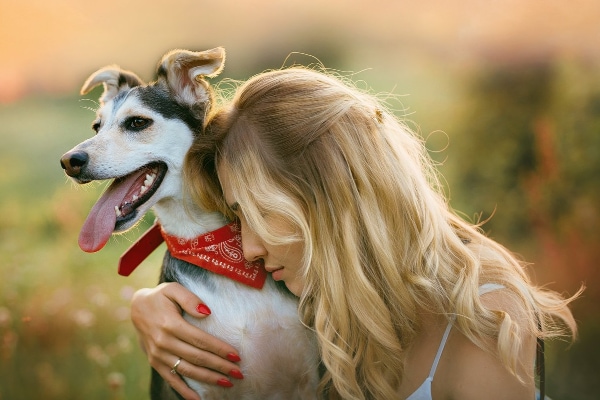
FAQ #4: Can I get monkeypox from my dog?
Since there has only been one confirmed case of a dog with monkeypox at this time, it is difficult to know for certain if dogs can carry monkeypox and spread the disease to people. However, public health officials suspect that an infected dog could spread the virus to you or other mammals.
Currently, if you live in the United States, the chances of you catching monkeypox from an animal is very low. You are more likely to develop the disease after coming in close contact with a person with monkeypox.
FAQ #5: What are the symptoms of monkeypox in dogs?
After exposure to monkeypox, it takes an average of 7 to 14 days for clinical signs to develop. It appears that all infected animals and people will develop a fever and swollen lymph nodes. This means you may notice lumps at the external lymph node locations in dogs. Other possible symptoms include:
- Cough
- Red, swollen eyes
- Nasal discharge
- Decreased appetite
- Decreased energy or a lethargic dog
- Appearance of muscle aches and pains
However, please remember that there is only one reported case in dogs at this time, so it is difficult to know for certain what symptoms can develop. Researchers suspect that the disease may present differently in different animals.
After these initial symptoms develop, most animals (and people) will develop a skin rash. It will start as a mild rash that looks like oddly colored patches of skin. Then the discoloration will progress to small bumps that can become fluid-filled blisters called vesicles. In some cases, these blisters may become pus-filled and irritated. After the blisters rupture, the wounds will become scabs.
In people, the disease usually lasts about two to four weeks. Health officials suspect that the time frame would be similar in dogs and other animals.
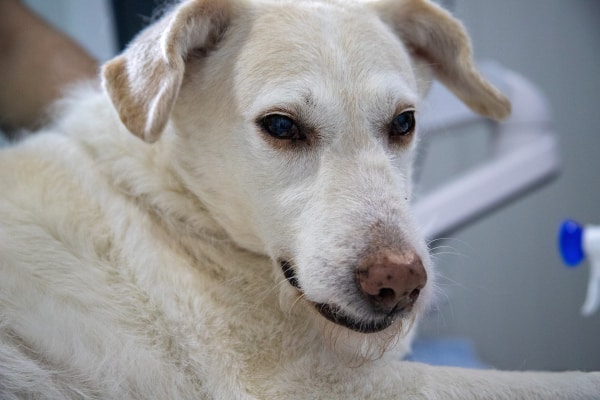
FAQ #6: Can monkeypox kill dogs?
In humans, monkeypox is usually self-limiting and does not cause deadly disease. If someone dies from monkeypox, they are usually a senior citizen, a young child, or an immunocompromised person.
Scientists believe that this would be the same for dogs. This means that at this time, scientists don’t believe this infectious disease would kill most dogs. However, if you have a senior dog or immunocompromised dog, you should monitor him or her more closely after monkeypox exposure.
FAQ # 7: What should I do if I think my dog was exposed to or has contracted monkeypox?
If you think your dog has been exposed to monkeypox or has developed clinical signs, please consult your veterinarian immediately. He or she will be the best source of information for you and can help walk you through what to do.
In general, the CDC protocol for exposed dogs involves isolating your dog for 21 days to avoid contact with other pets or people in the house. It is especially important to keep your dog away from young children or immunocompromised people. Ensure you don’t let your dog lick your face or hands and wash your hands after touching your dog or his or her food dish, blankets, toys, or bed.
In addition to isolating your dog and minimizing contact with people (including you) or other animals, keep the following tips in mind if your vet diagnoses your dog with monkeypox:
- Do not take your dog on walks, to the dog park, or groomer.
- Do not use chemical disinfectants or cleaning products on your dogs. This includes alcohol, Lysol, bleach, hand sanitizer, laundry detergent, and kitchen cleaning wipes.
- Do not put a mask on your dog.
- If your dog has open wounds, prevent him or her from licking them using an E collar.
- Wear goggles, gloves, a mask, and a disposable gown (or long pants and shirt) when caring for your dog. Once you are done, carefully removed your personal protective equipment (PPE) and properly dispose of it.
- Wash your hands often and avoid touching your face, eyes, nose, and mouth.
- Wash your dog’s blankets, toys, and beds separately from other laundry using hot water.
Note: The information listed above is general guidance and not intended to be all-inclusive. I want to remind you again that the best thing you can do if your dog was exposed or has monkeypox is to stay in close contact with your vet and follow the guidelines laid out by the CDC for your particular situation.
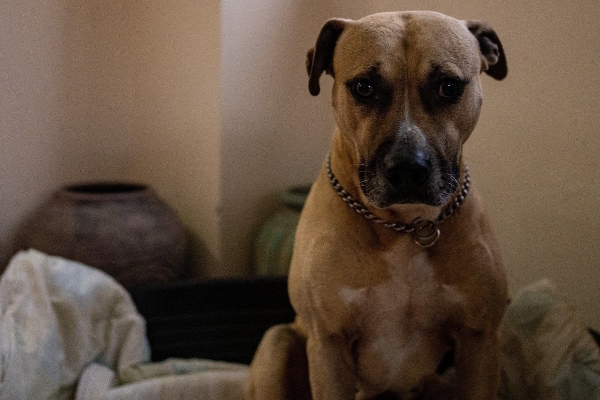
FAQ #8: How is monkeypox diagnosed in dogs?
In order to diagnose your dog with monkeypox, your veterinarian will need to perform a physical exam and submit some samples to a lab for testing. Your veterinarian will probably take skin samples from your dog, especially if he or she has open wounds or scabs.
Additionally, your veterinarian might collect hair samples or blood samples. He or she will send these samples to a lab for tests, some of which can also help rule out other diseases that can look similar to monkeypox.
Finally, if your dog’s doctor suspects your dog has monkeypox, he or she will contact local health authorities as well. It is important to document cases of monkeypox in dogs since there has only been one case. Also, if there is another case, the health officials will want to know so they can investigate the disease spread.
FAQ # 9: What is the treatment for monkeypox in dogs?
There is no specific treatment or cure for monkeypox in dogs. Usually, the disease will “run its course” and then resolve.
However, the blisters and rash can be painful. Your veterinarian might offer supportive care to help keep your dog comfortable. This could include anti-inflammatories or other pain medications. In some cases, your dog may need fluids as well. Other treatments might include bandages or medications applied to the blisters.
If your dog develops monkeypox and you notice his or her symptoms worsening, please contact your veterinarian immediately.
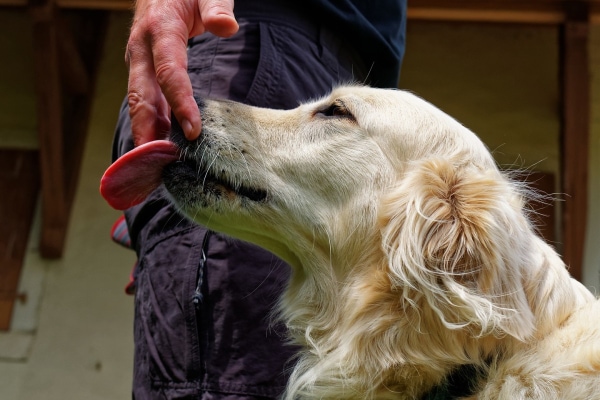
FAQ # 10: If I have monkeypox, how can I avoid spreading it to my dog?
People diagnosed with monkeypox should avoid close contact with pets and other people.
If your dog doesn’t have monkeypox, the best plan is to have someone else (like another family member or friend) care for your dog. If that absolutely isn’t possible, keep these tips in mind to decrease the risk of spreading monkeypox to your dog:
- When interacting with your dog, you should always wash your hands first—especially before handling food/water bowls, toys, or medications.
- Do not let your dog lick any blisters or rashes that you develop.
- Do not sneeze or cough near your dog.
- Avoid letting your dog sleep on your bed.
- Wash your sheets and clothes regularly.
- Do not cuddle, kiss, or hug your dog.
- Do not let your dog lick your face or hands.
In addition to following these guidelines, please contact your personal doctor if you develop monkeypox. He or she can advise you on proper precautions and treatment from a human-health standpoint. The CDC also has some good resources about how to disinfect the home and care for yourself while sick with monkeypox.
Finally, it is important to note that there is no approved vaccine for monkeypox for dogs. Currently the best way to prevent your dog from getting this virus is by avoiding exposure and practicing good sanitation.
Your veterinarian is a good resource
It can be upsetting to be facing another disease outbreak, but thankfully there are some positives. Monkeypox in humans (and presumably dogs) seems to be self-limiting in many cases. Plus, to date only one dog has contracted monkeypox, so the chances of your dog getting monkeypox too are pretty low.
Still, it is always a good idea to be vigilant and practice good hygiene. And of course, if you have any questions or concerns, please contact your veterinarian or local health officials.

